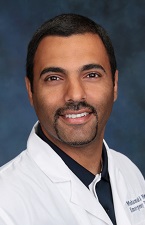Alumni of the Month Features
Wade Lee-Smith
B.S., Chemistry: 1989-1993.
UToledo Professor & Research Engagement Librarian.
Wade Lee-Smith loved his time in the Honors Program so much, he decided to build his
career at UToledo! After graduating with his Bachelor’s degree in Chemistry in 1993
and earning his Master’s in Library Science at Indiana University in 1994, he returned
to campus as a faculty member in University Libraries. Though he had always gravitated
to science and research, Lee-Smith ultimately realized he wasn’t meant to handle small
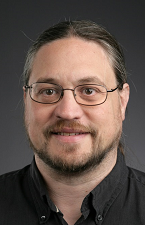 chemicals. He asked a librarian if he should switch his major and was told that, if
he liked science and was good at it, he should stick with Chemistry since librarians
need to earn an M.L.S. eventually anyways. Now a Research Engagement Librarian with
a background in STEM, this Rocket’s trajectory has come full circle!
chemicals. He asked a librarian if he should switch his major and was told that, if
he liked science and was good at it, he should stick with Chemistry since librarians
need to earn an M.L.S. eventually anyways. Now a Research Engagement Librarian with
a background in STEM, this Rocket’s trajectory has come full circle!
Over the last thirty-five years, Lee-Smith has seen UToledo Honors morph and grow.
When he started in 1989, the Honors Program had just emerged from its longstanding
administration by the College of Arts and Sciences. In fact, the Honors advisors were
stationed in a house that was owned by the university on the other side of Bancroft
Street! The unit’s secretary had an office in the dining room, and the Honors student
lounge was stationed in the living room.
As the years have slipped by, Lee-Smith has cherished his memories of Honors while
celebrating its continuing evolution. The friends and connections he made as a Rocket,
meanwhile, will stick with him forever. “The old joke that the benefit of being in
Honors was getting to register first is just the beginning!” he said. “Afterwards,
I remained close with many of my Honors peers. It does make for a nice ‘network’ to
start out with in college.”
Besides the fellowship nurtured by Honors, Lee-Smith relished the Program’s hallowed
tradition of the undergraduate thesis. He sought to determine for his project what
properties of a particular molecule designed to increase the contrast in MRI scans
would determine whether the molecule was excreted from the kidneys or the liver. He
also examined whether it could cross from the bloodstream into the brain. The undertaking
required Lee-Smith to visit the libraries of the Medical College of Ohio and the University
of Michigan – a formative experience for him!
“Above all, though, I treasured the small class sizes made possible by Honors – the
community that valued our discussing concepts together and not just passively absorbing
lectures,” he said. He enjoyed the graphic novels that Professor Walter Denk brought
to the Honors lounge, but Lee-Smith’s favorite Honors courses included a series of
calculus classes. They never enrolled more than ten people, he recalls – a cohort
that would always shrink to four before exams. One semester, he and his classmates
even got to “train” their new instructor after a course’s original, first-year professor
had taken a sabbatical. By the end of the term, they had convinced the new faculty
member that it was an Honors tradition for the group to go to Pizza Hut following
exams!
Another standout seminar was taught by a few librarians that showed Lee-Smith how
much he loved looking for information and which convinced him to become an academic
librarian. Now a Professor himself, he has actually taught this course a few times!
Joseph Piasecki
B.A., Economics: 1966-1970.
Collections, Credit, Contracts Negotiation, Conflict Resolution, and Client Relationship
Management Specialist.
Joseph R. Piasecki was a man of many talents, interests, and disciplines. Of these
myriad relations, accomplishments, and distinguishing stations in life, one stands
out as most gratifying to the UToledo Honors community: alumnus.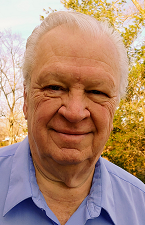
Piasecki was born in Toledo and attended UToledo for his Bachelor’s degree in Economics,
which he earned cum laude with University Honors in January of 1970. A well-rounded
student, he balanced membership in the Honors Program and a devotion to his major
studies with participation in Student Government and efforts to establish WXUT 88.3
– the campus radio station that still operates today! After graduating, Piasecki studied
at the University of Pennsylvania and researched mental health. Later, he returned
to UToledo as a member of its Board of Trustees and served as an Assistant Provost.
Piasecki began his career working as a Business Manager at AKF Engineers LLP, where
he was responsible for credit policies, contract negotiations, claims management,
disputes, and court actions. He also appeared in federal court multiple times to successfully
coordinate legal defense teams in this position. After his time with AKF Engineers
LLP, Piasecki was Sole Proprietor at JP RMP for eleven years. There, he operated as
a private consultant for business and credit practices supporting law firms, architects,
and engineers.
Following his pursuit of a doctorate from The Wharton School at UPenn, Piasecki served
as a fellow for the National Institute of Child Health and Human Development, as a
Research Director at UPenn and at the Horizon House in Philadelphia, as well as the
President of Mid Atlantic Information and Communications Systems. He also helped draft
federal funding applications to develop and implement a national database of children
with special needs who awaited adoption.
When Piasecki was not working, he enjoyed golf and spending time with his wife and
fellow UToledo Honors Rocket, Marlene, as well as with the rest of his family. An
avid volunteer, he also dedicated his time to assisting adoption agencies, acting
as a census taker, and advocating for low-income households which lack access to banking
services. Piasecki also worked after retirement as a high-end limousine driver, logging
more than 1,000 rides in his spare time.
Joseph Piasecki was an optimistic person who loved to care for his family and friends,
many of whom considered him a second father. He unfortunately passed away at the age
of 75 on December 18th, 2022. Leaving a lasting impact in all aspects of his life,
his friends, family, community, and university will remember him for years to come.
Brad Windbigler
B.B.A., Finance: 1994-1998.
Vice President and Treasurer at Arrow Electronics.
When Brad Windbigler fell in love as a student in the mid-1990’s with the beauty of
UToledo’s campus, little did he know that its burgeoning footprint would presage the
impressive growth of his own career in finance. The excitement filling the air between
the newly appearing academic buildings and residence halls at the expanding edges
of campus inspired him to become one of its premier student leaders. The resultant
skills and mentorship by faculty who cared deeply about his success set Windbigler
on a path through the echelons of corporate 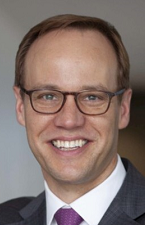 leadership – one culminating in his current role as Vice President and Treasurer at
Arrow Electronics in Denver, Colorado.
leadership – one culminating in his current role as Vice President and Treasurer at
Arrow Electronics in Denver, Colorado.
Given the extent of his involvement on campus, Windbigler jokes that he effectively
had a “second major in activities” to accompany his main one in Finance. He had fun
as a member of the Kappa Delta Rho fraternity, as a Freshman Camp participant, and
as a resident advisor on campus. But it was in Student Government, where he served
as President and a Senator, as well as in Levis Leadership where Windbigler began
to lay the foundation for his professional future. The latter in particular caught
his eye as he conducted his college search. He joined nearly thirty first-year peers
in Levis Leadership who, over all four years of their college experience together,
honed their management skills with sponsored speakers and guided activities.
These values of community and self-exploration were further developed by his participation
in the Honors Program. Windbigler’s first college class, “Honors Readings Conference,”
demonstrated how transformative education could be by encouraging close connections
among his classmates and with the professor. Honors made “a big institution feel smaller,”
he said, at a crucial new chapter of his life. This support continued through the
duration of Windbigler’s college experience and culminated in his Honors thesis, which
was focused on financial planning for the underprivileged. Noting his current work
in that very same field, he credited Honors with “planting the seeds for my future.”
Following these years as an Honors Rocket, Windbigler would go on to earn a Master’s
degree in Entrepreneurial Finance and Accounting from Babson College and serve in
senior roles at Lucent Technologies and at Western Union for twenty-five years. It
is in recognition of his decades of success at the intersection of finance and strategy
that Windbigler was named this year's recipient of the James K. Larson Distinguished
Achievement Alumni Award!
Keefe Snyder
B.S., Mechanical Engineering Technology: 2002-2006 & J.D.: 2006-2010.
Co-Owner of Earnest Brew Works.
No, this isn’t the start of a bad joke. It actually describes the unlikely career arc of UToledo Honors alumnus Keefe Snyder, whose journey at UToledo started with an undergraduate degree in Mechanical Engineering Technology in 2006 before culminating in a juris doctor four years later. The precision, openness to experimentation, and imagination demanded by all of these fields ultimately blended with
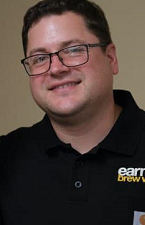 Snyder’s entrepreneurial spirit and passion for home-brewing beer, leading him to
co-found Earnest Brew Works in South Toledo in 2016. The venture has been a resounding
success, leading to a second brewery location being added downtown in 2021.
Snyder’s entrepreneurial spirit and passion for home-brewing beer, leading him to
co-found Earnest Brew Works in South Toledo in 2016. The venture has been a resounding
success, leading to a second brewery location being added downtown in 2021.Though only sixteen years have passed since Snyder was an undergraduate on campus, Honors at UToledo has noticeably changed. “The Honors Program was located in Sullivan Hall at the time,” he pointed out. “I think there was one computer lab (full of colorful iMacs!), a study area, and a few classrooms there.” Despite its subsequent growth in student population and expanded footprint on campus, though, many things about Honors at UToledo have remained the same. “Apart from the lively debates in the ‘Honors Readings Conference’ courses, it was almost always quiet and peaceful in Sullivan with a great mix of students,” Snyder said. And, of course, there is the perennially coveted Honors perk – priority course registration. “It was always a relief knowing you could get into the classes you needed ahead of others,” he recalled.
But more significant than any sustained benefit or where an office is housed on campus is the continued mission of Honors: to graduate students as creative, critical thinkers who can communicate well. It is these traits that led Snyder to reject complacency, merge his divergent areas of expertise, and embrace opportunity alongside a business partner.
His “Honors Readings Conference” classes were small, intimate affairs that offered engaging discussions not possible in large, lecture-style courses. “The small class sizes really helped me connect and build friendships with my peers,” Snyder observed. The intensive research papers in his Honors electives were intimidating but eventually helped him grow as a scholar. Improved multi-tasking accompanied the enhanced workload – a useful skill as he became progressively busier throughout college. Problem-solving in small groups for his Honors classes readied Snyder for close-quarter collaboration on his Engineering Senior Design Project, while the emphasis on reading and writing in the former prepared him for law school.
Ultimately, all of these experiences in Honors equipped Snyder for the day-to-day challenges of running a small business – leading a team, managing inventory, navigating legal regulations, et cetera.
Slinging sage insight as effortlessly as he would heady suds, Snyder offered the following advice to current Honors students. “Start building your professional network now and keep in touch with your friends after college – some of them will surprise you with what they go on to achieve,” he shared. “Enjoy your time at the university, it goes quickly!”
Dr. Nancy Collins
B.S., Biology: 1965-1969 & M.S.: 1970-1972.
Retired Laboratory Director at Memorial Sloan Kettering Cancer Center.
Dr. Nancy Collins’s story as an Honors Rocket is one defined by several pioneering
firsts. Before graduating in 1969 with a degree in Biology, she conducted novel research
into the environmental microbiology of fecal contamination in the Ten Mile Creek during
the previously unstudied winter months. In so doing, she also became the first student
to pursue a senior research project jointly overseen by Toledo University’s 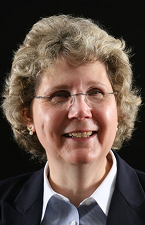 Microbiology Department and the newly created Medical College of Ohio at Toledo. But
most apropos of an approaching sixtieth anniversary for UToledo Honors, Dr. Collins
counts herself among the second entering class of Honors students at this university!
Microbiology Department and the newly created Medical College of Ohio at Toledo. But
most apropos of an approaching sixtieth anniversary for UToledo Honors, Dr. Collins
counts herself among the second entering class of Honors students at this university!
Following two gap years spent in Spain with her husband, who was serving there in
the U.S. Navy, Dr. Collins returned to campus in 1970 to begin earning her Master’s
of Science – which she completed in 1974. She then obtained a Ph.D. from the University
of Rochester in 1977 before concluding two years of postdoctoral work at the University
of Pennsylvania. Following that, Dr. Collins served for thirty years as Laboratory
Director of the stem cell transplant and cellular therapy lab at Memorial Sloan Kettering
Cancer Center in New York.
Still a close-knit community of serious and curious students today, the Honors Program
in 1965 offered Dr. Collins and her twenty-nine peers a different kind of refuge.
Amidst the social unrest, demonstrations, death, and fear of the draft instigated
by the Vietnam War, she deeply valued the “supportive and protective academic bubble”
nurtured by Dr. Ernest Gray and Dr. James Larson. She made it a point to take at least
one Honors seminar every semester, classes that allowed Dr. Collins to explore subjects
she was interested in but could not adopt as majors. Her Honors courses also taught
her to not fear being wrong. “When one philosophy professor understood I just could
not wrap my head around how philosophers thought and wrote in a course examining science,
morality, and religion, he told me to just describe my interpretation of the assigned
readings,” Dr. Collins recalled. “What I got out of any text was always pretty far
afield from whatever was the general consensus of its meaning ascribed by proper scholars!”
“Now, fifty-eight years after I entered the Honors Program,” she continued, “I see
how the twists and turns of my career make sense in the context of early decisions
I made while in ‘Honors Readings Conference,’ studying in the stacks of the library
(an Honors perk I especially loved), and arguing in the Honors lounge.” The comfortable
furniture in the lounge proved convenient host to meetings, discussions, and impromptu
parties. “We would often eat dinner there picked-up from the local campus fast food
places, and, occasionally as a splurge, would travel to the original Mancy’s Steakhouse
in West Toledo,” Dr. Collins said.
Though there were no Honors sections of Biology courses offered in those years immediately
relevant to her career aspirations, the Honors Program still encouraged Dr. Collins
to “listen, organize, write, network, and engage with others” – as well as pursue
her senior research project. She learned to trust her abilities and question standard
interpretations through Honors, finding her unique voice to form and articulate her
own beliefs.
As a trailblazer and pedigreed professional, current Honors students would do well
to follow Dr. Collins’s advice for achieving academic and personal success. She suggests
students get an education in “the greatest sense of the word” and identify their passion
– that which is worth their time and energy. “Take advantage of your professors, peers,
and other professionals in fields that interest you – ask questions and listen closely
to the responses,” Dr. Collins said. “Travel to see the places where the actual work
that you are interested in is taking place, and work or volunteer whenever possible
to serve the campus and greater community.”
“Do what is asked of you, then do a little bit more,” she concluded. “You will be
remembered.”
Dr. Kevin Hayes
B.A., English: 1978-1981 & M.Ed.: 1981-1983.
Professor Emeritus of English at the University of Central Oklahoma.
Though he initially intended to move away from his native Toledo for college, a chance
encounter with a coworker and eventual fellow Rocket would set Dr. Kevin Hayes on
an unexpected detour from Purdue University to his now alma mater as an Honors student.
After starting classes at Purdue as a Chemical Engineering major, Dr. Hayes quickly
realized that lecture halls filled with 500 classmates were too impersonal for him.
Following a decision to transfer to UToledo, a waitress at Bob Evans, where he also
worked as a grill cook, encouraged him to apply to the Honors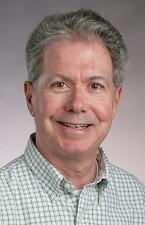 Program. The rest for this future scholar of American literature was history.
Program. The rest for this future scholar of American literature was history.
Dr. Hayes vividly remembers entering the tiny Honors building for the first time.
“Dr. James Larson had a small office, which appeared to be an old dorm room,” Dr.
Hayes recalled. “The two Honors instructors, who taught the freshman readings course
and also served as counselors, had even smaller offices.” During that visit, Dr. Hayes
instantly felt welcomed – the cozy atmosphere making him feel right at home. “How
different it was from my first day of class at Purdue,” he observed.
Indeed, Dr. Hayes’s favorite part of the Honors Program would become its seminars,
which exposed him to new worlds and perspectives that he did not glimpse in high school.
“The first course I took was Dr. Larson’s year-long seminar, ‘The History of the Creative
Arts,’” Dr. Hayes said. “I felt like some watcher of the skies when a new planet swims
into his ken. It remains one of my favorite classes of all time.” Other standouts
included Dr. Alfred Cave’s course in Native American history and culture as well as
a class focusing on African art taught by a faculty member from the Toledo Museum
of Art.
After graduating in 1981 with his B.A. in English, following a stint as a “bike bum”
in his twenties, Dr. Hayes eventually returned to college at the University of Delaware
in 1987 to earn a Master’s degree followed by a doctorate in 1991. He then took a
position as a professor at the University of Central Oklahoma, where his Honors experience
at UToledo helped him connect with his students. “Every once in a while I would meet
a student who had transferred from the University of Oklahoma complaining about its
lecture halls filled with hundreds of students, to which I could certainly relate,”
he said.
Inspiration from his Honors years also found its way into his textbook selection for
his “World Literature” course at UCO – a favorite of Dr. Hayes. When teaching it for
the first time, he settled on using an updated edition of the same anthology Dr. Larson
had adopted all those years ago. “In fact, I pretty much taught the same literary
works he had,” Dr. Hayes said. “I wonder if Dr. Larson ever realized his syllabus
would have a 24-year afterlife at UCO.”
If Dr. Hayes could offer current Honors students one bit of advice, it would be to
take all the Honors seminars they can. “If your experience turns out to be anything
like mine, it will open new worlds to you,” he said.
Judge Ian English
B.A., Individualized Studies: 1991-1997 & UToledo College of Law: 1997-2000.
Lucas County Common Pleas Court Judge.
Judge Ian English did not have a simple road to college. After telling his high school
guidance counselor that he wanted to attend university after graduation, the counselor
looked at his transcripts, up to the young man sitting before him, back down to the
transcripts, and then burst into hysterical laughter. He told English that the only
places for him would be trade 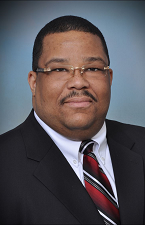 school or the military. But, after looking further into those paths, English knew
neither was for him. Though he grew up in a neighborhood of Toledo where young people
went to prison more often than they went to college, he was determined to make a future
for himself that fit his needs and desires.
school or the military. But, after looking further into those paths, English knew
neither was for him. Though he grew up in a neighborhood of Toledo where young people
went to prison more often than they went to college, he was determined to make a future
for himself that fit his needs and desires.
He fought his way into UToledo and started his path to becoming a lawyer. After persisting
through some difficult situations in his younger years, having noticed the targeting
of certain demographics in society, he realized that the world needed more people
fighting the moral and logical battles in our public sphere. A few semesters later,
he received a letter in the mail from the university. Worried about what the letter
would say, (“I had been parking in the right spot,” he jokes), he opened it cautiously
and prepared for bad news. He unfolded the crisp pages to find that he’d made the
Dean’s List! A couple of weeks later, he got another letter saying he made the President’s
List, too. Today, Judge English serves on the Lucas County Court of Common Pleas in
Ohio.
That success he attributes in part to the Honors College. Compared to those of the
broader university, the expectations of the Honors Program for its students were much
more robust - both socially and academically. Though he graduated as an undergraduate
twenty-five years ago in 1997, Judge English expects that the Honors Program is much
the same today in its most integral aspect: it’s personal connection. “The Program
values the student as a person and that value continues beyond undergraduate and graduate
educational programs,” he said. “Honors encouraged me to aim high and settle for nothing
less than excellence. Entering the Honors Program helped me believe that I could achieve
any goals and dreams in my future.”
In his Spring 2022 Medallion Ceremony keynote speech, Judge English quoted David Farragut,
a U.S. Civil War Naval officer, by saying, “Damn the torpedoes! Full speed ahead!”
This is his advice to students today. Don’t let someone else or something challenging
you set the limits of your success. Keep working toward your dreams, no matter how
bumpy the road appears ahead of you.
Dr. William Wians
B.A., Philosophy: 1971-1975.
Philosophy Professor.
When Dr. William Wians first arrived at The University of Toledo in 1971, the Honors
community was a fledgling collection of curious minds and warm hearts. The support
he received from this close-knit group of students in those early years of the 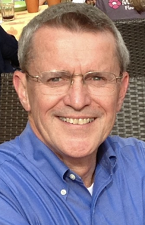 program both challenged and brought out the best in him.
program both challenged and brought out the best in him.
One of his favorite experiences was when its Director, Dr. James Larson, ordered blocks
of tickets for the Toledo Symphony Orchestra so that the Honors students could attend
for very little money. Yet, Dr. Wians says the greatest benefit of the program was
the advising he received about which professors and classes to take at the university.
“When I became Director of the Honors Program at Merrimack College in North Andover,
MA, I tried to pay forward what I had received by giving my students the best advice
I could - and by working to create the same sort of challenging, supportive community
I remembered from my time in Scott Hall.”
Dr. Wians' original goal as a Rocket was to advance to law school. He took philosophy
courses and was involved on the 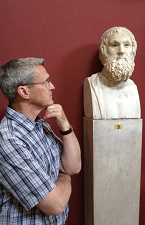 debate team, but it was ultimately an Honors course, "Introduction to Ancient Greek,"
that changed his direction. He graduated and instead went on to study ancient Greek
philosophy at the University of Notre Dame, where he received his doctorate. Since
then, he has taught philosophy at Boston College, Boston University, the University
of Chicago, the University of Notre Dame, and Merrimack College.
debate team, but it was ultimately an Honors course, "Introduction to Ancient Greek,"
that changed his direction. He graduated and instead went on to study ancient Greek
philosophy at the University of Notre Dame, where he received his doctorate. Since
then, he has taught philosophy at Boston College, Boston University, the University
of Chicago, the University of Notre Dame, and Merrimack College.
Dr. Wians advises that any undergraduate student, but Honors students in particular,
should study abroad for as long as possible. Because their objective is to improve
themselves through qualitative experience, and because an education abroad is like
no other, he suggests Honors students should take the opportunity to thus differentiate
themselves. “Work hard, take the most challenging courses you can," he says. "Make
excellence a habit. Your time in the Honors College can prepare you to compete with
the best.”
Dr. Thomas Wakefield
B.A., Biology: 1972-1975 & M.D., The Medical College of Ohio: 1975-1978.
Professor of Vascular Surgery.
If Thomas Wakefield, a professor of Vascular Surgery at the University of Michigan,
could relay any piece of wisdom to current students, it would be to learn as much
as you can in all fields but to follow your heart when choosing your career. In listening
to his, Dr. Wakefield went on to earn a B.S. in Biology with a pre-med concentration
in 1975 and an M.D. in 1978 from the Medical College of Ohio. What the UToledo Honors
Program provided him was the perspective as well as the 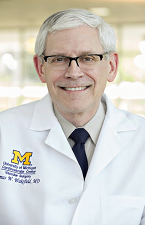 breadth and depth of knowledge to offer context and meaning to that career. Those
lessons on architecture, art, literature, and music profoundly shaped Dr. Wakefield
and enabled his capacity for appreciating the myriad moments of beauty in everyday
life.
breadth and depth of knowledge to offer context and meaning to that career. Those
lessons on architecture, art, literature, and music profoundly shaped Dr. Wakefield
and enabled his capacity for appreciating the myriad moments of beauty in everyday
life.
Some of those cherished memories included his first symphony at the Stranahan Theater
and driving around southeastern Michigan as well as the greater Toledo area with a
professor and fellow students to observe different forms of architecture. The moments
separating these excursions were also treasured, grounding deep conversations about
the meaning of life. Dr. Wakefield also met during these formative years his wife,
Mary, with whom he has shared 45 wonderful years! “Your college experience will end
all too quickly, so enjoy every minute of it,” he said. “By doing this, you will allow
more doors in your life to open than just what you planned for, and you will eventually
make your way toward your dreams.”
Besides his future wife, Honors would introduce Dr. Wakefield to a close-knit community
of peers and faculty mentors. When he graduated with his Biology degree in 1975, the
Honors Program featured only 30 students! The classes were thus intimate and created
a space that encouraged a great amount of discussion covering aspects of everyone’s
majors and interests. This inclusivity and warmth were due in no small part to one
of his favorite professors – Dr. James Larson. “Dr. Larson was a deeply caring individual
and an outstanding teacher, human being, and role model,” Dr. Wakefield recalled.
Dr. Mallory Ladd
B.S., Chemistry: 2006-2011.
CNA Defense Analyst.
When Dr. Mallory Ladd graduated in 2011, she made a point of doing so with as many
career options as possible. Already equipped with a major in Chemistry, a minor in
Spanish, and another minor in Forensic Science Investigation, she used the UToledo
Honors Program to study everything in between. Unsurprisingly, Dr. Ladd’s advice these
days to current students is to, “take classes and participate in activities that interest
you, even ones that may not necessarily fall within your 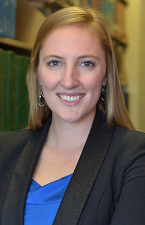 discipline.” Without the freedom to do that herself in college, Dr. Ladd suspects
she never would have made the enduring memories she enjoyed as a Rocket.
discipline.” Without the freedom to do that herself in college, Dr. Ladd suspects
she never would have made the enduring memories she enjoyed as a Rocket.
One of her favorite experiences was taking a road trip with a handful of other Honors
students and a couple of professors to the National Conferences for Undergraduate
Research in Ithaca, New York. She also found value in attending events and visiting
locations throughout the greater Toledo area as a form of critical assessment and
deep learning. Without the Honors Program, Dr. Ladd suspects her education would have
been regrettably limited to the confines of campus. Her extracurricular Honors excursions
instead connected her to the community in impactful ways and even led to the development
of many of her favorite hobbies!
Most importantly, though, Dr. Ladd says, “Honors taught me to be a better communicator,
learning how to speak about my work clearly to multiple audiences.” What she learned
here about communicating she crucially uses every day as a defense analyst for the
U.S. Navy and Marine Corps. In the role, she conducts scientific studies and relies
heavily on efficient collaboration to promote national security.
Dr. Ladd firmly believes that what she learned in Honors could have helped her in
any career, though. “Too often, students think they need a single vision board to
be successful,” she said. “But, in reality, the most successful people I've met are
the ones who keep multiple paths open to them and are flexible when the moment presents
itself to pursue that new opportunity.”
Paul Ewing
B.A., Russian Studies: 1966-1972 & M.A., History: 1972-1978.
Yavapai College Faculty Member.
With its founding in 1963, the Honors Program had itself hardly arrived on campus
when Paul Ewing joined its ranks in 1966. Even in its infancy, UToledo Honors profoundly
shaped his ability to think critically and interact with others – notably the dozens
of his peers in the program at the time. “Honors enabled me to engage in academic
discourse, to 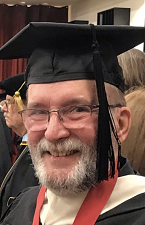 participate in the give-and-take necessary to understand issues of great complexity,”
Ewing said. As a Russian Studies major at the height of the Cold War, the training
proved indispensable. Ewing graduated magna cum laude in 1972 with his B.A. and then
received a Master's degree studying European history in 1978 from UToledo. He worked
as a liberal arts instructor at Yavapai College in Arizona between 1989 and 2017 before
earning emeritus status there in 2019. Now happily retired, Ewing devotes his time
to art classes, long-distance swimming, gardening, and reading.
participate in the give-and-take necessary to understand issues of great complexity,”
Ewing said. As a Russian Studies major at the height of the Cold War, the training
proved indispensable. Ewing graduated magna cum laude in 1972 with his B.A. and then
received a Master's degree studying European history in 1978 from UToledo. He worked
as a liberal arts instructor at Yavapai College in Arizona between 1989 and 2017 before
earning emeritus status there in 2019. Now happily retired, Ewing devotes his time
to art classes, long-distance swimming, gardening, and reading.
A highlight of his time as an Honors student was when his Russian and Soviet literature
instructor, Dr. Martha Manheim, asked Ewing to act as an interpreter for Russian pianist
Vladimir Ashkenazy when he performed at the Toledo Symphony Orchestra in 1969. In
Ewing’s courses, he had mostly been asked to translate plays and poetry such as Anna Karenina – a project that took him an entire year. Translating for a famous musician was an
altogether different challenge, though! Ewing attended a party with Ashkenazy after
the performance and did his best as an undergraduate to interpret. This was the first
of many experiences that prepared Ewing for the Russian he would use in later years.
This notably included being, “the only Russian-speaker of a four-person delegation
representing the International YMCA in a personnel exchange with the Soviet Committee
of Youth Organizations in 1975,” he said, which was later covered by a Soviet newspaper.
If Ewing could give current Honors students any advice, it would be to avoid comparing
oneself to others and to strive to the best of your abilities. Take risks as a growing
academic and professional while being confident in your choices, he adds. (In the
1970-1971 academic year, a political science professor informed Ewing he was on an
FBI watch list due to his Russian language studies and his subscription to the official
newspaper of the Soviet Union!) To underscore the point, Ewing quotes Indira Gandhi:
"Without courage, you cannot practice any virtue.”
C. David DeBenedetti
B.A., History: 1987-1991.
NY Attorney, Partner.
The essential value of UToledo Honors for C. David DeBenedetti was its status as a
hub for students like him – a place to gather and collaborate. Because of the like-minded
and similarly driven peers he met in the community, all of them guided by its dedicated
faculty, the future lawyer learned to present arguments with more diplomacy. He also
learned 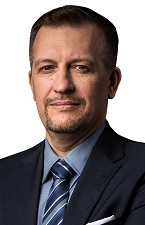 humility, something he struggled with at the fresh age of eighteen. “Good legal skills
get me ‘into the game,’” DeBenedetti said, “but long-term respect and reputation are
built on many pillars – one of which is the thinking process I learned in the Honors
Program.”
humility, something he struggled with at the fresh age of eighteen. “Good legal skills
get me ‘into the game,’” DeBenedetti said, “but long-term respect and reputation are
built on many pillars – one of which is the thinking process I learned in the Honors
Program.”
Though DeBenedetti’s legal reputation and skills would one day garner international
recognition, that career almost didn’t come to pass. While sitting down early into
his undergraduate tenure for a midterm meeting with his academic advisor, a professor
in DeBenedetti’s then-home department of Biology, his advisor sensed how unhappy DeBenedetti
was. Their conversation that day uncovered his true academic passion centering on
History and Political Science, setting him on his fateful path to professional prominence.
An attorney in the state of New York since 2001, DeBenedetti specializes in investment,
hedge, and special situation funds. He has taught seminars to post-graduates at the
Lazarski School of Commerce and Law as well as at Boston University. In 2010, he entered
the list of foreign lawyers at the Regional Chamber of Legal Advisors in Warsaw and
became an arbitrator for the Court of Arbitration at the Polish Chamber of Commerce.
He has spoken at several international meetings and conferences, mainly in New York
and Japan, and, since 2015, has been a member of the board of the Polish Chamber of
Commerce and Industry in Japan. Today, he advises American, English, German, and Japanese
clients on investing and other issues related to business in Poland.
If DeBenedetti could give the Honors students of today a bit of advice, it would be
to pay attention to those often-repeated lessons: stay involved, work hard and smart,
as well as be trustworthy and respectful. “Some mistake these characteristics for
weakness,” he said, “but, in truth, they are signs of underlying strength.” Above
all else, though, DeBenedetti urges us to be open to learning about the people and
events we encounter in our lifetime. “I could keep going with more platitudes and
repeat things said by people I admire,” he added, “but I hope these small points stay
with you as a good reminder of the basics.”
Lastly, there is the considerable value of appreciating the humanities. “The ability
to discuss classic literature, from The Iliad to The Great Gatsby, is a crucial undercurrent of professional life,” DeBenedetti said. “Clients, co-workers,
and competitors alike will respect you more after a dinner conversation about the
classics.”
Dr. Mohamad Moussa
B.S., Biology: 1997-2001 & M.D., The Medical College of Ohio: 2000-2004.
Associate Professor of Emergency Medicine.
With a budding career dedicated to the instruction and training of others, Dr. Mohamad
Moussa owes more to UToledo Honors than just his love of learning. His path to professional
success was paved twenty years ago through an Honors curriculum emphasizing critical
thinking, discussion, and applied research.
An Associate Professor of Emergency Medicine at UToledo, Dr. Moussa first realized
his academic bent in “Honors Readings Conference” and in his Honors seminars. “Honors
showed me that I am a life-long learner and influenced me to seek knowledge from as
many sources as possible,” he recalled. “I was learning alongside students with similar
ambitions and goals – it really improved my ability to express myself as I progressed
through my career.”
Now in his role as Director of the UToledo Emergency Medicine Residency Program, Dr.
Moussa has the chance to share this inspiration with others just beginning their careers.
“I am privileged and lucky to combine knowledge, medicine, and empathy to take care
of patients and their families,” he said. “But the most rewarding aspect of my job
is watching my emergency medicine residents utilize what I have taught them over the
years of their training.”
This passion for education joins the friendships Dr. Moussa developed in Honors and
the exciting classes with faculty like Dr. Cindy De Saint Victor as highlights of
his undergraduate career. Then, there was the time he and some classmates traveled
to a Montana research conference in Missoula to present as a group – a “great experience!”
“The Honors Program was a platform offering you that extra boost to achieve your goals,”
Dr. Moussa added. “I loved every second of my time in it – I know it made a difference
in my training.”
Now, twenty years later, Dr. Moussa's career is replete with achievements. In addition
to leading emergency medicine at UToledo's College of Medicine and Life Sciences,
he serves on their Admissions Committee and Alumni Affiliate Board of Trustees as
well as represents the college on UToledo's Faculty Senate. He also sits on the UToledo
Alumni Association’s Board of Trustees and on the UToledo Physicians Clinical Faculty
Board of Directors. Finally, Dr. Moussa is also an examiner for the American Board
of Emergency Medicine.
Connect with Dr. Moussa on Twitter @MMoussaMD.
Douglas Rammel
B.A., Philosophy: 1986-1990.
Entrepreneur and Angel Investor.
Twenty years ago, in the basement of Carlson Library, Douglas Rammel had the world
opened to him for the first time by his Honors “Cultural History” instructor, Dr.
James Larson. A self-described “accidental entrepreneur” and venture 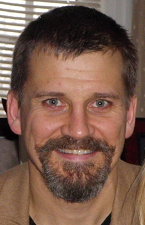 capitalist, Rammel’s enthusiastic exploration of that increasingly complex world in
the ensuing years has garnered him commercial and personal success. It is fitting
that he was chosen this year to receive the distinction named in honor of his influential
mentor – the James K. Larson Distinguished Achievement Alumni Award.
capitalist, Rammel’s enthusiastic exploration of that increasingly complex world in
the ensuing years has garnered him commercial and personal success. It is fitting
that he was chosen this year to receive the distinction named in honor of his influential
mentor – the James K. Larson Distinguished Achievement Alumni Award.
As a consultant to those starting their own businesses, and as the founder of a few
thriving companies of his own, Rammel’s time as an Honors student was formative. “The
Honors Program for me was a revelation as I had come from a small, rural school district
near Dayton,” he said. “I was suddenly exposed to a group of diverse, smart kids my
age who challenged and stimulated me. We argued, studied, explored, and grew together
– we got involved on campus and made things happen.”
The small, collaborative Honors classes trading in perspective and inspiration offered
Rammel and his peers an intimate liberal arts college experience alongside the myriad
resources of a research university. “Our professors leveraged the Toledo Museum of
Art, the industry labs of Owens-Illinois and Glasstech, Inc., and the growing computer
lab capabilities on campus to make our classes and life discussions come alive,” he
said.
Rammel himself got involved in lab research under Dr. Stephen Goldman infecting corn
embryos with agrobacterium containing modified genetic material. His interdisciplinary
streak continued with a senior year Honors philosophy class under Dr. Susan Purviance
about the ethical and economic dimensions of healthcare resource allocation and distribution
that formed the basis for his Honors thesis. “Understanding whole scale systemic thinking,
whether biological, economic, humanistic, philosophical, or geopolitical in orientation,
is crucial to having the frame of reference to understand your place and path in the
world – and my Honors experience offered me that,” he said.
Though navigating an increasingly interconnected and interdependent world is challenging,
Rammel says that life itself is simple. “It’s about figuring out who you are, what
skills and talents you have been blessed with, and whom it is you want to spend your
limited time on Earth with,” he noted. “I’m an investor, but moreover a husband who
coaches ball, Ubers kids, teaches class, and cleans the house – including washing
the dishes!”
Rammel advises this introspection for current Honors students followed by bold steps
to capitalize on it. “Take full advantage of the opportunities presented to you throughout
school and the Honors College as well as in life,” he said. “You will ultimately make
your own luck, as you will either be ready to recognize and leverage options that
open up to you – or you won’t. Being prepared and aware will make all the difference!”
Jeff Schaaf
B.B.A., Entrepreneurship, Family, and Small Business: 1994-1998.
Director of Talent Strategy for Toledo Regional Chamber of Commerce.
As a 1998 graduate of The University of Toledo, Honors alumnus Jeff Schaaf has always
had an interest in and passion for the city of Toledo and its business community.
Schaaf graduated with a Bachelor of Business Administration, majoring in 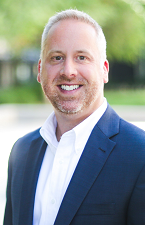 Entrepreneurship, Family, and Small Business while minoring in Marketing. He is currently
the Director of Talent Strategy at the Toledo Regional Chamber of Commerce.
Entrepreneurship, Family, and Small Business while minoring in Marketing. He is currently
the Director of Talent Strategy at the Toledo Regional Chamber of Commerce.
Schaaf described his college experience as diverse and thought-provoking, making him
a better strategic thinker and problem-solver – thanks in large part to his Honors
classes. “Having spent my K-12 years in Catholic schools, my Honors courses provided
an opportunity to take classes with professors and classmates from varied cultures,
backgrounds, and countries,” he explained. “It challenged and encouraged me to explore
other viewpoints.” Schaaf advises current Honors students to take an internship at
least once during their college career.
“The opportunity to develop the skills you are learning in the classroom is valuable,
and the potential network you create will really help you further your career,” he
said. “There are so many unique companies in the Toledo region. Working for one of
them is not only a great way to gain some experience, but an internship is also a
way to get out into the community and really learn what Toledo has to offer.”
The hands-on learning emphasized by the Honors Program involved Schaaf early in analyzing
and influencing area commerce. He investigated for his Honors capstone whether the
Toledo Mud Hens should build a new stadium downtown or remain in the suburbs. “There
was limited public information available that showed a positive impact from building
a minor league stadium in an aging Midwest city,” he remarked. “Access to the Internet
was still in its early phases, so I had to rely on newspaper and magazine articles
that were available from various libraries.” While Schaaf says his conclusion that
the stadium should not be built downtown was shortsighted, the experience was something
for which he is still thankful. “Fifth Third Field was obviously built in the heart
of the Warehouse District, and we can all appreciate the effect it has had on the
community and downtown,” he said. “It’s now an integral part of this city, and I couldn’t
be happier that 22-year-old me was wrong.”
Jason Bissell
B.B.A., Accounting: 1988-1992.
Director of Financial Reporting & Controls Governance for Owens-Illinois, Inc.
Following his 1992 graduation from The University of Toledo, Jason Bissell jumped
right into the professional business world, prepared by his experiences in the Honors
Program. “I remember how unique the small, conference room settings of our classes
were,” he explained. “I wholeheartedly believe that the conversations in the Honors
courses were at a much 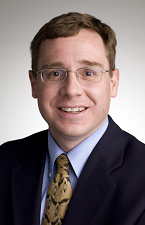 higher level than those in my other classes.” Bissell, who graduated with a degree
in Accounting and went on to receive his M.B.A. at Purdue University, is the current
Director of Financial Reporting & Controls Governance for Owens-Illinois, Inc.
higher level than those in my other classes.” Bissell, who graduated with a degree
in Accounting and went on to receive his M.B.A. at Purdue University, is the current
Director of Financial Reporting & Controls Governance for Owens-Illinois, Inc.
During his time in Honors, Bissell was deeply impacted by field trips to the Toledo Museum of Art during a cultural arts class taught by Dr. James Larson. “This was my first exposure to any art museum and I just couldn’t believe that Toledo had such an impressive collection,” he said. “Those field trips were really unique experiences for me to get off campus and learn so much about the rest of the world.” Another faculty member that left a meaningful impression on Bissell’s college years was Dr. Bill Ruud, who he says stressed how a good education can lead to many future opportunities. “He was a really great communicator and was able to bridge academics to the real world in a way that made us want to learn more,” Bissell recalled.
When asked what advice he would give to current Honors students, Bissell noted how Honors courses allow you to practice in preparation for real-world settings. “Don’t be afraid to voice your opinions in your Honors courses and don’t be afraid to be challenged by your classmates or professors, he said. “Your ability to think critically, effectively manage constructive input, and defend your positions will prepare you well for when you graduate and enter the working world.”
Dr. Jackie Vannuyen
B.S., Biology: 1992-1995 & M.D., The Medical College of Ohio: 1997-1999.
Obstetrician & Gynecologist.
Dr. Jackie Vannuyen, a two-time graduate of The University of Toledo and the alumna
keynote speaker for the Fall 2019 Medallion Ceremony, credits much of who she is today
to her time at UToledo and its Honors Program. Vannuyen studied Biology with a pre-med
concentration and then graduated from The Medical College of Ohio, completing her
residencies at the Maimonides Medical Center in Brooklyn and The George Washington
University in Washington, D.C. “In a pre-med track, a Biology major is a dime a dozen,”
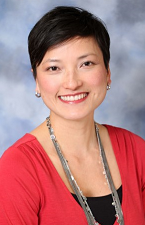 she said. “Honors gave me an almost post-graduate experience and helped me explore
my interests with several research opportunities and exposure.”
she said. “Honors gave me an almost post-graduate experience and helped me explore
my interests with several research opportunities and exposure.”
“In Honors, I was surrounded by top achievers,” she added. “I learned that being the ‘best’ was not always measured by what I was used to. My Honors experience helped me gain an open mind, empathy, patience, coping skills for failure, and introspection. These life skills helped me become who I am today.”
Along with her work in medicine as an obstetrician and gynecologist, Vannuyen is deeply involved in the community, specifically with the local chapter of Girls on the Run – a national organization devoted to developing confidence in young girls. Women’s empowerment is a passion that Vannuyen’s Honors experience helped cultivate. “Dr. Jamie Barlowe, a professor of Women’s and Gender Studies, is a strong female role model and was crucial to my feminist upbringing,” she explained. “If I had not been in Honors, I likely would not have taken her class. As a Biology major, that Honors course helped me discover a new lens with which to view the world. Through her, I discovered a passion for Women’s and Gender Studies as well as issues with which other marginalized groups struggle.”
When asked about other faculty that impacted her education, Vannuyen noted that Dr. David Hoch, the Director of the Honors Program at the time, was a mentor whose friendship she enjoyed far beyond her college years. “He was never one of my professors or my advisor, but he had a way of connecting with everyone regardless,” she explained. “Through quiet and comical conversations, he taught me to slow down, to take advantage of the opportunities the Honors Program had, and to understand that college was more than just a path to your career.” She and Dr. Hoch kept in contact throughout Vannuyen’s time in medical school and, once she returned to Toledo, they remained close friends until his passing in 2006.
“My experience at UToledo and in the Honors Program were major determinants of my life’s journey,” Vannuyen said, noting that along with her career successes, UToledo introduced her to her husband of 18 years. They currently live in the Toledo area with their two children and two dogs. “If I would’ve gone to a different school and had a different experience, I would have a different story. Suffice it to say, I’m quite happy with my current one!”
David Rowan
B.A., Economics & Political Science: 1971-1975.
Chief Legal Officer as well as Chief Governance Officer and Secretary of the Cleveland
Clinic.
David Rowan, an alumnus of UToledo Honors and this year’s recipient of the James K.
Larson Distinguished Achievement Alumni Award, has made a name for himself in Ohio
and around the world. Rowan graduated from UToledo double-majoring in Economics and
Political Science in 1975 and went on to 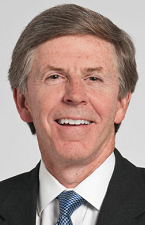 attend Georgetown University Law Center, where he earned a Juris Doctorate in 1978.
He currently serves as the Chief Legal Officer as well as Chief Governance Officer
and Secretary for the Cleveland Clinic, where he manages its worldwide legal responsibilities
in places such as Ohio, Florida, Nevada, Toronto, London, and Abu Dhabi.
attend Georgetown University Law Center, where he earned a Juris Doctorate in 1978.
He currently serves as the Chief Legal Officer as well as Chief Governance Officer
and Secretary for the Cleveland Clinic, where he manages its worldwide legal responsibilities
in places such as Ohio, Florida, Nevada, Toronto, London, and Abu Dhabi.
Rowan attributes much of his collegiate success to his Honors education, including mentorship from Dr. Larson, the Director of the Honors Program. “He was always someone that I could go to and discuss my professional development with,” Rowan said. During his years at UToledo, Rowan says that Honors allowed him to interact with other programs and pursue many interests outside of his major, such as literature. “My many Honors classes really amped my ability to interact with other people, something I do a lot of in my career today,” he explained. When invited back to campus for UToledo Homecoming celebrations last weekend, Rowan noted that he was impressed by both the development of the physical campus grounds and the expansion of Honors into the Jesup Scott Honors College. “I was excited to see the opportunities students have now to build a diverse education, and look forward to the great things that will produce in the future.”
Dr. Burr Zimmerman
B.S., Chemical Engineering: 1994-1998.
Co-founder and Principal of Urban Venture Group, Inc.
Tell us about yourself.
I grew up in Grand Rapids, Michigan and was an undergraduate student at UT. I worked
in the pharmaceutical industry for a number of years, went back to 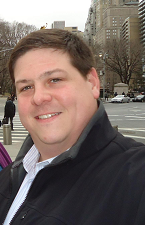 school for a Ph.D. in Chemical Engineering, and then started a consulting company.
My company is called Urban Venture Group, Inc., and I describe what we do as “innovation
consulting.” We focus on raising capital to support early stage technology research
and development. I am still a huge Rockets fan – I come back to campus for UT football
and basketball games and attend a lot of road games, too. Goooo RRRRockets!
school for a Ph.D. in Chemical Engineering, and then started a consulting company.
My company is called Urban Venture Group, Inc., and I describe what we do as “innovation
consulting.” We focus on raising capital to support early stage technology research
and development. I am still a huge Rockets fan – I come back to campus for UT football
and basketball games and attend a lot of road games, too. Goooo RRRRockets!
Why did you decide to leave the pharmaceutical industry?
It was really cultural. I’m more of a rule-breaker rather than a rule-follower. The
pharmaceutical world is highly regulated, as well it should be. That meant I found
myself trying to be innovative in a system not designed for innovation. What prompted
me to make the change was when I oversaw a pharmaceutical manufacturing process. I
made a change to the procedure, in a way that didn’t affect the regulatory filing
so that we could implement with minimum disruption, and that ended up saving the company
almost a million dollars a year. The company awarded me its highest technical award,
which was great. They also took me aside and said, “Don’t do that again,” however,
and reassigned me to a position where I couldn’t make those kinds of changes. This
was a tough lesson about the difference between what I thought was good for the company
and what the company wanted from me. I decided I wanted to be in a place where innovation
was more aligned with the overall mission.
As the alumnus keynote speaker at the Spring Medallion Ceremony on Sunday, what advice
did you offer the Honors graduates?
I touched on a few themes that hopefully will be meaningful for a graduating Honors
student getting ready to enter the workforce, go to graduate school, or start a business.
I focused on risk-taking. The way in which today’s economy is changing, becoming skills-based
instead of job-based, it gives today’s graduates new opportunities to create individualized
forms of professional happiness.
The way the human brain works, it makes us bad at judging risk. We tend to overestimate the risk of change and underestimate the risk of staying the same. A paycheck every two weeks might feel safe. It can be tempting to discount or ignore “new economy” jobs. Being an entrepreneur, “freelancing,” or “gigging” might feel risky. If you create a startup or freelance, after all, your income almost assuredly will fluctuate. But along the way, you will constantly be developing new skills and learning what people will buy, honing your skills around things people need. In contrast, if you work at the same job for a while, your skills narrow and become stale. This has happened to a number of my friends: your employer has a poor quarter, you get laid off, and now your income has zeroed-out. Your skillset is built around a job you no longer have and a career that may not even exist anymore. You found out the hard way just how risky that paycheck is.
The real risk is not taking risks.You need to take risks to learn, to keep your skills relevant, and to grow. The faster the world changes, the faster the economy changes, the more critical it is to stay nimble and engaged. Stability is the risk.
I stumbled into this way of thinking. When I graduated from UT in 1998, I had an Internet startup that I just shut down to accept a “real job.” I made the very decision that I’m telling you to avoid. Since then, I stumbled around in the dark to get to what I do today. I consider myself lucky. I can tell you, it wasn’t planned. But, looking back, I want to let other people know that this path is not just important; it is possible. I wake up each morning and have to pinch myself that I get to do this for a living. I love what I do. It’s fun, it’s invigorating, it’s challenging, and it’s important. You just have to keep an eye out and look for opportunities to break out of your mold.
What kind of skills or perspective did you gain from the Honors College?
I like working with others – communicating and not just doing. I also don’t like working
on the same thing all the time. I like to have my hands in lots of different cookie
jars. The Honors Program gave me an outlet to fulfill my interests outside of Engineering
and have a more diverse social and intellectual experience. In fact, I almost transferred
out of Engineering and into a Biology-Philosophy dual major because I loved my Honors
Philosophy class so much!
What is a memory at UT you would say influenced you later in your career?
Two come to mind, actually. The first time I ever came to campus, I visited unannounced.
I just showed up one day in the summer. I was walking through the old Engineering
Science building and Dr. Steven LaBlanc, who was then the chairperson of Chemical
Engineering, poked his head out of his office and asked if I was lost. I told him
I was there visiting, and he sat down and talked with me about the program. He spent
a lot of time with me, I don’t even know how long. I came to Toledo because of the
spirit and the dedication that he showed. To this day, I remember Dr. LeBlanc and
it reminds me to always be looking to help others and try to give back.
The second was when Dr. Vik Kapoor was the Dean of Engineering. He asked me to develop a digital portfolio for the new engineering campus – when Nitschke Hall was being built. It was a great responsibility, more than I had ever taken on before, and it required skills that were new to me. It was 1996, the “World Wide Web” was brand-new, and the college didn’t own a digital camera! I was motivated and, thanks to Dr. Kapoor, I felt empowered. When the project completed successfully, he created a “Student Innovation” award to recognize my role – and gave me a pay bonus, too. Dr. Kapoor modeled for me the importance of having a vision and perseverance. I didn’t think about it at the time, but he also showed me how important it is to set people up for success – put them in the right position and let them do what they do best.
Alan Lapp
B.A., History: 1965-1969 & J.D., UT College of Law: 1969-1972.
Retired Deputy Chief Counsel and Chief Hearing Examiner for the Ohio Environmental
Protection Agency.
What was the Honors Program like when you were a student?
I joined the third Honors Program class as an entering freshman in the Fall of 1965.
There were approximately 30 students in that class. The Director of the 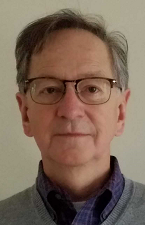 Program was Dr. Ernest Gray and the Assistant Director was Jim Larson. The class divided
in half for two freshman Readings Conference sections, each of which was taught by
Professors Gray and Larson. The requirement for graduating with University Honors
then was the successful completion of at least 12 Honors classes.
Program was Dr. Ernest Gray and the Assistant Director was Jim Larson. The class divided
in half for two freshman Readings Conference sections, each of which was taught by
Professors Gray and Larson. The requirement for graduating with University Honors
then was the successful completion of at least 12 Honors classes.
What skill, perspective, or wisdom gained from your time here most contributed to
your success?
In my mind, these three questions are all variations on a theme. The Honors Program
didn’t necessarily create my love of reading and my desire to learn, but the Honors
experience certainly reinforced and expanded them. I remain a constant reader and,
I hope, learner. Through all the reading and interaction with my professors and fellow
students, I learned to think critically, analyze, and evaluate opposing opinions and
points of view, develop coherent arguments, as well as write clearly and persuasively.
These were important qualities in my law school and career experiences.
What is a favorite memory from your Honors experience?
The entire Honors experience was memorable to me; it’s difficult to pick out one or
two. However, I really enjoyed the Readings Conferences, the freedom to take any course
being offered at any time regardless of prerequisites, the one-of-a-kind Honors seminars,
as well as socializing and arguing with fellow students in the Honors lounge.
Are there faculty in particular you remember?
Ernest Gray and Jim Larson for Readings Conference and their constant association
as Director and Assistant Director. I also fondly recall Noel Leathers and his seminar
on “The Age of Romanticism” as well as Herbert Schering and his seminar on “Goethe’s
Faust.”
What would you like our current students to know about you?
I graduated from The University of Toledo College of Law in 1972 and began my employment
in the Legal Office of the newly created Ohio Environmental Protection Agency that
Fall. The Ohio EPA became my career, where I served as Chief Hearing Examiner and
Deputy Chief Counsel. After retiring from the Ohio EPA, for a number of years I worked
with the Columbus Board of Health as a Hearing Examiner and Legal Consultant. I was
a member of the Board of Directors of the Ohio Environmental Council for 12 years.
As important as the Honors Program and my fraternity were to me, the most significant
event of my college experience was meeting Susan Carlson. In January, we will have
been married 49 years.
What advice would you like to give our current students?
Life and careers can be complicated. You are likely to make mistakes now and then.
Develop a short memory. Don’t dwell on them. Learn from them and move on.
Craig Holden
B.A., Interdepartmental: 1977-1983.
Currently Director of Corporate and Foundation Relations at the New Mexico State University
Foundation.
What was the Honors Program like when you were a student?
The Honors Program was quite small when I was in it – 100 or 125 students total. It
was in one of the small buildings in front of University Hall and felt very 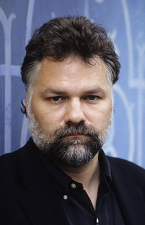 comfortable – like a club, almost. I enjoyed all three advisors but was closest to
Dr. Jim Larson – that relationship has lasted a long time. Mary Sue Cave (Deisher)
and Trudy Chermak were the other two. They all taught and were always happy to sit
and discuss whatever was on my mind. I stayed at UT because of the Honors Program,
and it felt like my little home inside a big city. I liked that very much. Although,
the fact that Honors is its own college now is pretty impressive and cool in its own
way.
comfortable – like a club, almost. I enjoyed all three advisors but was closest to
Dr. Jim Larson – that relationship has lasted a long time. Mary Sue Cave (Deisher)
and Trudy Chermak were the other two. They all taught and were always happy to sit
and discuss whatever was on my mind. I stayed at UT because of the Honors Program,
and it felt like my little home inside a big city. I liked that very much. Although,
the fact that Honors is its own college now is pretty impressive and cool in its own
way.
How did the UT Honors experience influence you as a person?
It influenced me greatly, both in terms of the advice I received about becoming a
writer, and also the classes I took – especially the Honors seminars. One offered
a history of thought through great books and the other focused on art and cultural
history. Both were year-long courses. To gain scope of the history of the world in
those ways couldn’t help but have a big effect on how I saw it. I spent my junior
year in England and had a chance to travel around the continent to see in the real
world where some of these events took place.
How did Honors influence your success in meeting your professional goals?
I knew I wanted to write, though I also held a pre-med concentration for a time. In
fact, I got a job at St. Vincent Medical Center through the pre-med program and ended
up working there for over three years. At the end of it, I knew I wanted to write,
not go to medical school. The Honors Program had prepared me for that in non-traditional
ways, I suppose. Jim Larson had advised me from the beginning not to major in English
or take too many creative writing classes. Rather, he told me to read and study as
broadly as you can, which is what I did. I took courses in a lot of natural sciences,
social sciences, and liberal arts – especially philosophy. That has always stood me
in good stead. I find that nothing I’ve learned has been wasted. When it comes to
writing books, all knowledge and experience is valuable. My first novel, for instance,
was about a doctor and drew on my experiences at St. Vincent’s.
What skill, perspective, or wisdom gained from your time here most contributed to
your success?
In addition to the above advice, Jim also offered me valuable insight regarding writing.
I told him that I loved the idea of having written. He said, "Well, of course. Everyone
loves the idea of having written. You'd better figure out whether or not you love to write." So I spent several years after that just working and writing. And realized
I did love it! I then went to graduate school to get an MFA. But that time writing,
alone, in an apartment on Torrey Hill Drive, was invaluable. I don’t think I wrote
one word that was worth anyone reading, but I came out of it knowing something about
myself.
What is a favorite memory from your Honors experience?
It’s hard to name a single memory. I didn’t socialize a whole lot as an Honors student.
Or rather, much of the socializing I did was in the library. There was a lounge then
where you could eat and smoke (believe it or not), and we spent a lot of time there
and up in the stacks studying, talking, and wondering about the future. Collectively,
those are good memories. I also really just liked the coursework, especially the reading.
My vistas expanded so broadly at the time that it’s hard to describe now.
Are there faculty in particular you remember?
I mentioned three of them above. In addition, Dr. Tom Barden and Dr. Harriet Adams
in English were also key to my education – Tom with folklore studies and Harriet with
creative writing. The first money I ever got for writing was a $25 English Department
prize for an essay I wrote in one of her classes. It would be another 15 years before
I got any more money for writing! Another professor I learned a lot from was Dr. Steve
Goldman in Biology. He taught genetics and was really tough. But the thinking in that
class, the logic of it, was remarkable to me.
What would you like our current students to know about you?
I suppose that when you’re looking at a writer, everything you really need to know
is in the books. Aside from that, I came from a pretty humble place in Toledo. My
parents were school teachers. We didn’t have a lot of money. I didn’t meet one professional
writer until I left for graduate school. So it’s not like I had an inside track. I
had no idea what I was doing. I just did what I loved and learned as much as I could.
And even after graduate school, when I went to New York to work in publishing, I had
no special connections. It was just following what I wanted to do, meeting whomever
I could meet, and working hard – both in the office and on my writing. That’s pretty
much how I still live.
What advice would you like to give our current students?
Do what you love. Life is long – at least in the beginning, it seems that way. And
to spend years doing something you don’t look forward to seems pretty miserable to
me. I don’t dread Monday mornings. I look forward to the work I do here in New Mexico,
and always to writing. I work most of the time, both in the office, after work in
coffee shops, and at home on the weekends. I suppose I’m a workaholic, but it’s because
I’m doing what I want to do, not what I have to do. That makes all the difference.
Shamila Chaudhary
B.A., English Literature & Women's and Gender Studies: 1997-1999.
Currently a Senior Adviser to the Dean of Johns Hopkins School of Advanced International
Studies & Senior Fellow at New America.
What was the Honors Program like when you were a student?
The Honors Program had a very community-oriented feel to it. Most of the students
were coming from the social sciences and 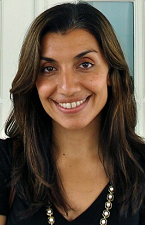 humanities, but we were all able to get individual support from leaders and faculty.
We were a close-knit family, so it’s where I ended up making my closest friends. The
seminars were also extremely interdisciplinary. I remember in one class, being able
to talk about philosophy and biology in the same conversation – two fields so different
from each other. The experience was incredible!
humanities, but we were all able to get individual support from leaders and faculty.
We were a close-knit family, so it’s where I ended up making my closest friends. The
seminars were also extremely interdisciplinary. I remember in one class, being able
to talk about philosophy and biology in the same conversation – two fields so different
from each other. The experience was incredible!
How did it influence your success in meeting your professional goals?
I think it was the seminars that had the biggest impact. Having the interdisciplinary
aspect made it more fun and challenging. The seminars ended up furthering my interest
in politics because I was learning about so many different subjects. It also set me
up to have a good range of analytical and thinking skills, which I believe is important
for anyone working in policy. As an advisor in the White House and the State Department,
I would have to deal with things I’m not exactly an expert in – and do it with urgency.
Having those skills from the Honors seminars, I knew how to react to these problems
as they came in, rather than struggling to find ground.
What skill, perspective, or bit of wisdom gained from your time in Honors contributed
to your success?
David Hoch was the Director of the Honors Program while I was at UT. He spent so much
time with you one-on-one, at first you thought it was just for you! Then you looked
around and realized he spent the same amount of time with all of his students. He
put in what he wanted out of the Honors Program. I had never experienced that kind
of attention from a mentor before. I learned from Dr. Hoch and his team that how much
time and work you invest into something will carry into your outcome. From then on
I was looking for strong meaning and purpose in every project, meaning I wouldn’t
do anything halfway. Having that kind of mentorship taught me how I should treat other
people – how I should lead an individual or lead for a community.
What is a favorite memory from your Honors experience?
When I was in the Honors Program, we had Internet, but it was relatively new. There
was a messaging system called “the VAX” – an earlier platform for instant messaging.
We would go to our computer lab to work, but we would end up all messaging each other
to avoid writing our papers!
What would you like our current students to know about you?
I didn’t plan this kind of profession for myself; it just happened as I was going
about my business. It sounds strange, but it’s true. As I was going about the world,
I kept trying to find people that had the same interests as me. In doing so, I became
exposed to a lot of professional opportunities. I learned that you can’t plan for
success, but if you take care of your goals and your work, success will happen as
you’re going about your business. There’s not one model or path you can take. Typically,
people would look at my accomplishments and say “she got good grades and everything
she ever wanted,” but that’s the complete opposite of the truth. I didn’t always get
good grades nor was I always involved on campus. It wasn’t until I joined the Honors
Program that I was really challenged and found a path to start down. I want students
to know how I got to this point because, even though they may not feel confident in
where they’re at, what they’re doing now is exactly what they need to do to succeed.
About a year ago, you wrote an article in "The Atlantic" about the unlikely friendship among Muslim and Christian refugees here in Toledo.
What do you think we can learn from their example?
Seeing two people become friends, who back in their home countries may not have been
friends, shows us how important community is and how it can form relationships. America
is that kind of place where people from opposing sides can come together and become
close. I think the real lesson here is to not forget our country is a very unique
place, to not forget who we are and that the past is not behind us. My family is from
Pakistan. We faced our own challenges, but these transitions are still happening and
contain new challenges. We have a moral responsibility to help people fit in, and
work with the people that can’t. It’s easy to ignore these problems, but if we take
the time to work through it, it can really show how unique the U.S. truly is.
Judge Gene Zmuda
B.A., Political Science: 1977-1981 & UT College of Law: 1981-1984.
Currently Lucas County Common Pleas Court Judge.
“I’ve been here in Toledo my entire life – I did not choose to leave and have enjoyed
every bit of it!” remarked Judge Gene Zmuda, who works in the Lucas 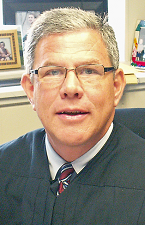 County Common Pleas Court. “I think I have the best job in the world.”
County Common Pleas Court. “I think I have the best job in the world.”
The successful, well-liked judge with a reputation of being fair but friendly, is a two-time alumnus of The University of Toledo. He earned his B.A. in Political Science in 1981 before pursuing a law degree at UT, which was achieved in 1984. Though well served by his studies, the elected official with 24 years of experience (10 years on Toledo City Council and another 14 as a judge), attributes much of his success to another element of his UT experience. According to Zmuda, none of these accomplishments would be possible without his time in the Honors Program.
The value of Honors, Zmuda said, can be traced to its “requirements about developing the person, the critical thinking that goes into you becoming a more holistic thinker.” As a political science major, Zmuda’s first days in the Honors Program were strikingly different than the days he spent working in his major. As one of the only students in his Honors classes not stemming from the field of medicine, he was surprised by how differently those from other fields thought and problem-solved.
“I realize they don’t think like I do, and a lot of that is how differently they analyze things,” he remarked. “I had never experienced that before […] the whole exposure to various viewpoints – I loved it!” In a profession dedicated to the interpretation and application of a legal tradition, these skills have been indispensable. “To view issues from a perspective other than ‘What is the answer?’ – to understand how decisions are made and explore along the way what it means to make a decision, these are skills I learned in Honors,” Zmuda said.
Though much of what it means to be an Honors student has not changed, Zmuda welcomes some of the changes in the community since his time as an undergraduate.
The Honors Program, “deserved to be a college, and I am happy it has become one,” he said. “It recognizes more clearly what Honors at UT stands for, which is the fundamental importance of a liberal arts education.”
When he began in the Honors Program, Zmuda worked closely with the then-Director Jim Larson. He believes it was Dr. Larson’s drive that allowed the Program to take off and eventually become what it is today. After Larson, Zmuda said that he and Director David Hoch became close, and that through Dr. Hoch the Program focused on what Honors could do to expand and help students. “Jim is responsible in my perspective for the starting of the Honors Program,” Zmuda explained. “He wasn’t the first director, but he really helped it grow. Then, when he retired, Dave Hoch ushered in features like service learning, trying to understand what broad role the Honors Program could fulfill for the student body, university, and community.”
After he graduated with his undergraduate degree and then as a law student, Zmuda remained in Toledo and began his long career as a public servant. In addition to serving the City of Toledo, Zmuda has contributed to the UT community by teaching courses in Honors and at the UT College of Law. He has taught a class on Political Leadership, provided guidance to the Mock Trial team, and even once brought his courtroom to campus. He scheduled one of his cases to be held in The McQuade Courtroom in the Health and Human Services Building for students to observe the proceedings and learn.
Zmuda’s advice for students entering the Honors College today is to expose yourself to as much as possible. “Don’t be afraid to pursue something, going out of your comfort zone. You will never retrieve the time once you graduate,” he added. “You’ll never be able to have the freedom you have now to figure out exactly what makes up you.”
Judge Zmuda was recognized for his contributions to the community and his embrace of the ideals of UT Honors as the 2017 recipient of the James K. Larson Distinguished Achievement Alumni Award.
Maureen Brown
B.A., Public Administration: 1973-1977.
Currently the Director of Private Banking at Fifth Third Bank.
What was the Honors Program like when you were a student?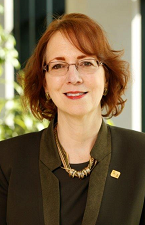 It was still relatively new, but was gaining traction and recognition on campus. You
definitely felt the sense of community and camaraderie in the Honors Program. You
could walk into the Honors lounge and feel the vibe – students and professors were
always having wildly interesting conversations about a wide range of topics, and welcomed
you into the discussion. The Program was a happy blend of challenging students’ intellectual
curiosity through independent study and small seminars, while affording you the ability
to “escape” many of the standard courses required for all new students at the university.
It was still relatively new, but was gaining traction and recognition on campus. You
definitely felt the sense of community and camaraderie in the Honors Program. You
could walk into the Honors lounge and feel the vibe – students and professors were
always having wildly interesting conversations about a wide range of topics, and welcomed
you into the discussion. The Program was a happy blend of challenging students’ intellectual
curiosity through independent study and small seminars, while affording you the ability
to “escape” many of the standard courses required for all new students at the university.
How did the UT Honors experience influence you as a person?
It influenced me more than I realized while at the university! The Honors Program
pushed me outside my comfort zone (thank you!), and that discomfort was part of my
“growth,” both intellectually and emotionally. I came into the Program as a sheltered
high school student, and quickly saw there was no place to “hide” for a shy and retiring
student (again, thank you!). I learned to have more confidence in my opinions, and
to freely express those in class and discussions.
The premise of the Program – allowing students to focus on their majors and areas of interest without having to take many of the standard required courses, afforded me the privilege of a deep dive into several areas of study. From that, I learned the power of intellectual curiosity and critical thinking. While I did not end up in a career of my major, I have carried those two traits into my career in banking, and they are useful every day.
How did it influence your success in meeting your professional goals?
My professional goals changed dramatically during my senior year. As part of my major
in Public Administration, I was able to do an internship for a quarter. That experience
was invaluable, and made me realize that my goal of working in government or politics
was not my cup of tea. That probably isn’t the typical result of an internship, but
it motivated me to look at a career in some aspect of business. When I graduated,
there were far more graduates than job openings, and I embarked on a career in banking.
My career found me, and I’ve spent over 38 years in an industry I love. The confidence
I gained from my Honors experience allowed me to make this late “U-turn” in my college
curriculum, and know that I had the skills to adjust and find my way. Flexibility,
whether in critical thinking or career strategy, is a valuable skill.
What skill, perspective, or bit of wisdom gained from your time in Honors most contributed
to your success?
My Honors experience taught me invaluable life skills: the importance of working hard
to create a solid reputation in your field of endeavor, intellectual curiosity (life-long
learner), flexibility (to take advantage of new ideas or opportunities), and the courage
to forge one’s own path. Those skills have served me well over my career, and I continue
to learn something new every day from clients, coworkers, or industry publications.
What is a favorite memory from your Honors experience?
I cannot pinpoint just one favorite memory. My Honors experience always brings to
mind a feeling of happiness at being able to partake in something important, stimulating,
and relevant. I still get that feeling from walking on campus today – this is where
you learn to be a part of something much larger than yourself, and it is exciting.
Are there faculty in particular you remember?
There are so many wonderful faculty members from those four years. Of course, Dr.
Jim Larson springs to mind – he was our fearless leader and an inspiration to the
Honors Program; Dr. Roger Ray, who brilliantly taught Medieval History and illuminated
the Dark Ages; Dr. Robert Freeman Smith and Dr. William Longton, who taught Latin
American History and Ante-Bellum History, respectively, and challenged me to see the
present through the voices and events of the past; and Dr. Ron Randall, who inspired
me to major in Political Science/Public Administration (and I still love politics
even though I did not make it a career!).
What would you like our current students to know about you?
I have had several five-year career plans, and every one of them was jettisoned for
an opportunity to take what appeared to be a step to the side with a new position
and challenge. Every one of those sidesteps has been rewarding, fulfilling, and ultimately
led to my current career in Private Banking with Fifth Third Bank. I don’t regret
any of my career decisions, and feel very blessed to have had so many wonderful mentors
and opportunities in my career. I truly enjoy helping clients simplify financial complexity,
and am thankful every day that I have a career I love.
What advice would you like to give our current students?
Many will tell you to have a career plan. This is usually great advice, but sometimes
the career we study for isn’t the one that ultimately finds us and captures our passion.
Be open to alternative paths, which may lead you to greater happiness and fulfillment.
The Honors experience is very special, so take advantage of every opportunity possible in the Honors College, and get involved in campus and community activities. Not only do prospective employers look for those well-rounded students, but you will find fulfillment in giving back.
Mark Luetke
B.Ed., Social Science and Journalism: 1966-1970.
Currently the President of FLS Group, a Division of Thread Marketing Group.
What was the Honors Program like when you were a student?
When I arrived on the UT campus in 1966, the Honors Program was relatively new – more
of a concept than a thing. The concept was to create a 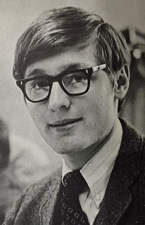 community that provided a path toward intellectual challenge and better academic success
that would be harder for a student to find if left to his or her own devices. The
delivery system was through Honors seminars with much smaller student-professor ratios
and much more intense learning than normally available. Plus, we got the opportunity
to do independent study with outstanding faculty in our individual degree-granting
college.
community that provided a path toward intellectual challenge and better academic success
that would be harder for a student to find if left to his or her own devices. The
delivery system was through Honors seminars with much smaller student-professor ratios
and much more intense learning than normally available. Plus, we got the opportunity
to do independent study with outstanding faculty in our individual degree-granting
college.
There was a “thing” – a small “Honors Lounge” on the ground floor of a now-departed dorm. Some students used it almost like a club – participating in ongoing card games and late-night discussions. Since I was working to earn school money, however, I never had the time to take advantage of the lounge – which is something that I regret.
Perhaps most valuable was that our Honors advisors really guided me through an innovative and outstanding academic program that served me exceptionally well in my professional career.
How did the UT Honors experience influence you as a person?
The Honors experience taught me that I had greater capabilities than I thought I had.
I was an underachiever in high school, and was recommended for the Honors Program
by a vice principal who saw something more in me than I did in myself. (I actually
accepted the invitation to join the Program only because they promised I could skip
English 101.)
Very quickly I was exposed to concepts and ideas that I never knew existed. I made relationships with students and faculty that expanded my point of view and broadened my expectations of myself. I learned critical thinking. The most lasting takeaway was that the Program made me more intellectually curious, nimble, and fearless – characteristics that have served me in good stead since.
How did it influence your success in meeting your professional goals?
Understand that my career followed a trajectory that was far from straight. I entered
UT thinking that I wanted to become a high school history teacher. While I did teach
for a few years after graduation (probably not very good – but highly entertaining),
I also worked as a production assistant at a weekly newspaper, show business publicist,
political campaign consultant, held several public relations jobs, and finally as
the founder and owner of a marketing company for 30 years.
My Honors experience taught me the value of listening and learning from others, organizing my thoughts and effectively advocating them, looking at the world in a holistic way. The collegial nature of our (relatively small) Honors cohort allowed me to perfect teamwork, learn what I could from people smarter than me (there were a lot of those around), and embrace risk. All of this helped propel me to reach goals that I didn’t even know I had.
What skill, perspective, or bit of wisdom gained from your time in Honors most contributed
to your success?
In the second semester of my freshman year, journalism instructor Fred Endres told
me that I would miss most of the learning opportunities UT had to offer communications
students if I did not work for the Collegian. At his (very firm) urging, I walked
into the student newspaper office one afternoon and its very fine editor, Tom Taylor,
handed me an assignment to cover a campus speech by the Speaker of the Ohio House
of Representatives. When I saw my byline that first time, I was hooked. With the encouragement
of Taylor, Endres, and a handful of outstanding journalism faculty, I moved up the
ladder to edit the paper myself as a senior.
That was a year of foment on campuses nationwide, and our Collegian staff covered student anti-war protests, the takeover of University Hall by a student group, the shooting deaths of four unarmed student protesters by the Ohio National Guard at Kent State University, the first Earth Day – and the start of a 35-game win streak by the football Rockets. As editor, I became close with President (William) Carlson and his outstanding vice president, Jesse Long, many faculty and administrators, and the media professionals at The Blade. That admonition to join the paper built a foundation for a lifetime of contacts and success.
What is a favorite memory from your Honors experience?
I created and taught a for-credit Honors symposium my senior year. At the time, I
became engrossed with Daniel Boorstin’s book The Image and its prophecy that “pseudo-events” would shape the media landscape of the future
(we know how that turned out). Dr. Ernest Gray encouraged me and a 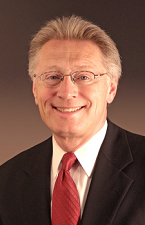 fellow student to put together a syllabus and green lit the class. How many students
get an opportunity like that?
fellow student to put together a syllabus and green lit the class. How many students
get an opportunity like that?
Are there faculty in particular you remember?
Dr. Gray directed the Program at that point, assisted by Dr. James Larson (who eventually
went on to become director), and both had a profound impact on me. In addition, the
program allowed me to take Honors symposia in my degree-granting college (Education).
There, Dr. Edward Nussel showed us how good teachers got that way, and Dr. Jack Ahern
encouraged us to be fearless.
What would you like our current students to know about you?
My experience in the Honors Program had more impact on my life than anything – other
than meeting my wife.
What advice would you like to give our current students?
Learn your primary profession, but also get good at 2-3 side skills. Build a personal
“advisory board” of 3-4 people you can trust and admire to help direct you on personal,
professional, leadership, and financial questions. This cast of characters may change
over your lifetime, but asking questions of smart people will never fail you. Be flexible
and take risks.



